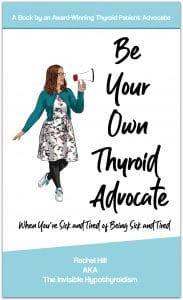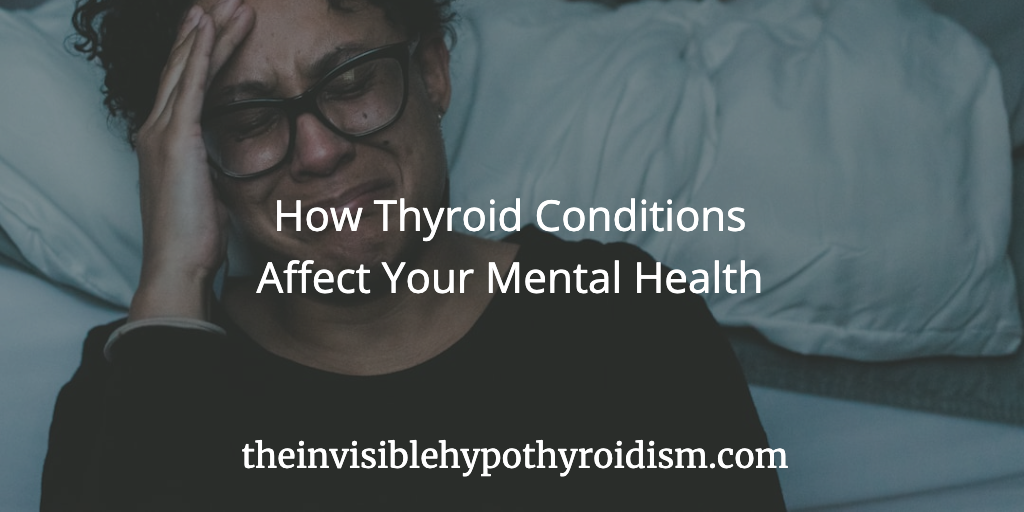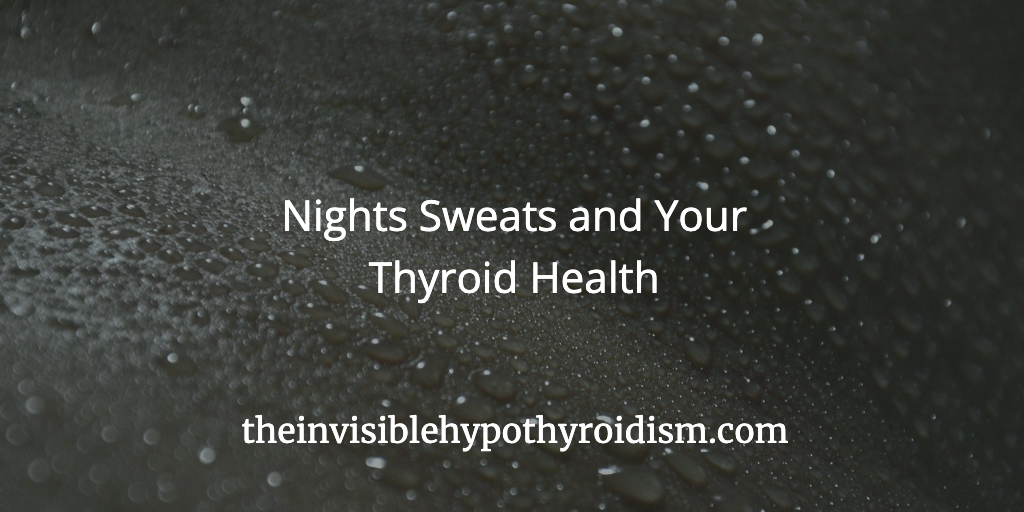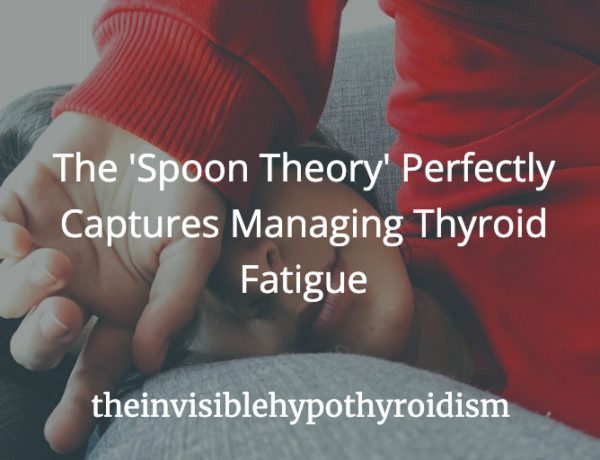Originally published on 2nd April 2016 Last updated on 3rd July 2024
TW: Mental Health, Depression, Suicide
Hypothyroidism often comes hand in hand with mental health conditions such as mood swings, anxiety and depression. I continue to speak about this at great length as mental health is such a big part of many people’s experiences of thyroid disease. After all, it was mine.
Mental Health Struggles
In thyroid patients of all ages, many of them may be labeled with psychiatric issues such as mental health issues, when they are actually due to hormonal insufficiencies such as hypothyroidism or adrenal dysfunction. In one study, it was concluded that by correcting the underlying hormonal imbalance, many patients’ mental health improved, with some patients having a total reversal of psychiatric symptoms. [1]
According to Thyroid UK’s survey in 2015, over 50% of the hypothyroid patients who responded, also reported living with depression. [2]
The survey also revealed that of those taking antidepressants, 47% said they saw no difference to their depression. Why? The underlying problem, being the non-optimally treated thyroid condition, or possibly adrenal dysfunction (as we will explore in this post), may not be being addressed.
What sort of mental health or wellbeing problems do we experience?
- Depression
- Anxiety
- Feeing very emotional
- Mood Swings
- Brain Fog
- Troubles Concentrating
Taking Medication for Mental Health Conditions Isn’t Wrong
I want to start by making something very clear: Antidepressants, anti-anxiety meds and more, can be a great help to many people struggling with their mental health, and it is important we do not feed the stigma that taking them is ‘wrong‘.
I am not anti-medication, but I am pro-informed decision, which means making sure those that who are thyroid patients and also experiencing mental health conditions, know that addressing their endocrine health fully may well resolve their mental health complaints.
I have taken various types of antidepressants in the past. However, none of them helped me at all, which is perhaps a sign that it was due to a hormonal imbalance of thyroid hormone. Especially as my mental health hugely improved when optimally medicated for hypothyroidism.
Here are the possible causes for poor mental health as a thyroid patient.
Your Thyroid and Mental Health
Many hypothyroid patients find that their non-optimally treated hypothyroidism or Hashimoto’s is labeled as depression.
Some patients do have both a thyroid condition and mental health condition, but doctors should realise that depression isn’t a scapegoat for all symptoms left from a non-optimally treated thyroid condition.
For example, there are some symptoms of depression that are the same as those for hypothyroidism, such as:
- Low mood
- Being slow in speech and/or movement
- Constipation
- Feeling more tired than normal
But equally, there are some that are not present in depression, such as:
- Thinning of eyebrows
- A puffy face
- Overwhelming fatigue
- Dry skin
- Hoarse voice
- Muscle weakness
- Slow heartbeat
- Raised blood pressure
- Raised cholesterol
These are physical symptoms, and not caused by something mental, but something physically wrong.
They could well be a sign that the thyroid patient isn’t optimally treated on their thyroid medication and this should be investigated. After all, if a hormonal imbalance, such as hypothyroidism, is addressed, the need for further medications can be avoided.
When I raised these very concerns, I had two separate GPs tell me that it was all in my head and that I needed “to let it go”, which wasn’t useful at all! Read my article about medical gaslighting here.
We know our own bodies and we know when something isn’t right.
The link between depression and hypothyroidism involves T4 and T3, the stored and active thyroid hormones, respectively. We need the correct amount of both to feel well.
However, most of the time, doctors in the UK especially will only prescribe T4-only medications (such as Levothyroxine) for hypothyroidism, which means that we are relying on our bodies to convert some of that T4 in to the T3 we also need, and well… it doesn’t always work so smoothly. This is why so many thyroid patients continue to feel unwell.
Low Free T3
Having low Free T3 is a possible cause or contributor for depression, mood swings, anxiety etc. especially when on T4-only medication such as Levothyroxine.
If this is present, then once it is treated with either an increase in medication, a switch to a thyroid medication that contains direct T3, or the conversion of T4 to T3 is otherwise improved, mental health often improves greatly.
This was certainly true for me. When I switched from T4-only Levothyroxine to NDT, which contains direct T3, my anxiety, depression and over-emotional tendencies improved hugely and swiftly.
T3 has an important role in the health and optimal functioning of your brain, including: cognitive function, the ability to concentrate, mood, memory and attention span and emotions and ability to cope with life’s stresses.
T3 interacts with brain receptors and makes the brain more sensitive to chemicals such as Serotonin and Norepinephrine, which affects your alertness, memory, mood and emotion.
So if your doctor has not checked a full thyroid panel or Thyroid Function Test (not just TSH), you may have low Free T3 levels. If they did check them and say they’re normal, you can check if they are more specifically optimised.
Hashimoto’s
Hashimoto’s, prevalent in about 90% of us with hypothyroidism, is reported to cause swings of TSH, with hyperthyroid and hypothyroid symptoms to match. [3]
Hyperthyroid symptoms can include hyperactivity, anxiety, irritability and disturbed sleep, whilst hypothyroidism often causes fatigue and depression. Do those swinging symptoms remind you of anything? Bipolar Disorder perhaps?
Also known as manic depression, it could well be suggested that some Bipolar diagnoses are actually masking Hashimoto’s cases, where patients swing between hypo and hyper symptoms, as the thyroid is attacked and destroyed, and thyroid hormone is released into the bloodstream in waves. If you also feel as if you swing from depression to anxiety, it could be a possibility too.
Bi Polar is a well-recognised and very real condition in its own right, I want to make that clear, but it is helpful to screen for thyroid issues in anyone with it.
The 2002 study: “High Rate of Autoimmune Thyroiditis in Bipolar Disorder: Lack of Association with Lithium Exposure”, found that Hashimoto’s antibodies were more prevalent in a sample of outpatients with bipolar disorder (28%), in comparison to a control group (3-18%). [4]
However, what complicates things is that bipolar patients are often treated with Lithium, a drug well-recognised to cause hypothyroidism and trigger Hashimoto’s. So was the thyroid condition there first, or did the lithium cause it?
Lowering thyroid antibodies, also referred to as ‘putting Hashimoto’s in to remission’, may therefore help. I have an article on how I got mine in to remission here and an article on general information for lowering thyroid antibodies here. However, there is no one size fits all solution for this and it appears easier for some than others.
Feeling Suicidal
Many studies also conclude a link between thyroid levels and mental health. In fact, suicidal patients have been found to have a higher incidence of thyroid disorders, with lower Free T3 levels than non-suicidal patients. [5]
Thyroid patient Jacqueline Falkowski sadly died by suicide in 2015, after twenty-six years of being misdiagnosed and improperly treated for her hypothyroidism.
She heartbreakingly shared in her suicide note:
“I have had an enormous uphill battle trying to get doctors to believe me and take my symptoms seriously. My GP was adamant that my thyroid was fine and my symptoms were all in my head… I had anxiety because he didn’t believe my symptoms were real – he persistently stonewalled me – and meanwhile, my hypothyroidism symptoms were becoming debilitating and intolerable.” [6]
Thyroid Symptoms Affecting Mental Health
Living with thyroid disease itself can impact our mental health if we’re finding it hard, too. It’s not easy to feel worn down, fatigued, achey and brain fogged all the time, especially if it impacts work, socialising and relationships.
When we change to a new thyroid medication or have the dosage adjusted, this can also cause mood swings, emotional swings and more, as our body adjusts.
Hypothyroidism can also cause changes in appearance, for example weight gain, acne and hair loss. These changes can be upsetting and lead to low self-esteem or depression.
Your Adrenals and Your Mental Health
Adrenal dysfunction could also be causing or contributing to depression and poor mental health in thyroid patients. I’ve covered what adrenal dysfunction is here.
Non-optimal cortisol levels may be common among thyroid patients, which may result in cell receptors failing to properly receive T3 from the blood.
This could explain why you may have some behaviour and symptoms typical of depression and continued hypothyroid symptoms, including:
- Wanting to be alone
- Unable to tolerate stress
- Jumping or feeling irritable at loud noises
- Emotional ups and downs
- Anxiety
You can test your adrenal function with a 24-hour saliva cortisol test, and work on addressing your cortisol slope if it isn’t optimal. If your doctor won’t run this, you can very simply order it yourself and complete it at home. You can find a test option here.
Once adrenal dysfunction is addressed or when you are starting to recover from it, you may see your symptoms easing. It is then important to maintain good adrenal health to prevent relapsing in future.
Vitamin Levels and Mental Health
Low vitamin levels such as iron, ferritin, B12, D etc. can all also affect mental health. Your doctor can test for most of these as standard blood tests and correcting low levels can work wonders for ongoing mental health complaints as well as many physical symptoms.
It is certainly not uncommon to have low levels of these nutrients alongside a thyroid condition.
The Takeway
If you have mental health struggles and also have thyroid or adrenal problems, or suspect you do, please do explore the above suggestions. You may just find that checking your thyroid (especially Free T3), antibodies, vitamin levels, cortisol levels etc. help you a lot. Addressing thyroid disease and living well with it is often like piecing together a jigsaw puzzle, after all.
Just trying to fix or even mask the poor mental health with more medication in the form of antidepressants for example, is simply masking the symptoms and not the actual cause.
Doctors would do us a great help by realising that giving us more and more medications that we may not actually need, instead of concentrating on making sure our endocrine health is optimised, isn’t helping us in the long run.
Have you had mental health difficulties which have been helped by optimal thyroid treatment? Feel free to add to the comments section.

The book Be Your Own Thyroid Advocate: When You’re Sick and Tired of Being Sick and Tired, which covers how Rachel went from being suicidally depressed with an under-treated thyroid condition, to finally thriving in life again and coming out the other side.
***
The following link has BEEN SPONSORED BY BetterHelp
As well as working on your thyroid hormone levels to improve mental health, you may benefit from seeking support from a therapist in the meantime, including those that can help you online: https://www.betterhelp.com/advice/psychologists/reasons-to-choose-an-online-psychiatrist/
References:
[1] https://www.ncbi.nlm.nih.gov/pubmed/16399913
[2] http://www.thyroiduk.org.uk/tuk/campaigns/Patient-Expereince-Survey.html
[3] https://www.ncbi.nlm.nih.gov/pubmed/3066320
[4] https://www.ncbi.nlm.nih.gov/pubmed/11958781
[5] http://www.scielo.br/scielo.php?script=sci_arttext& pid=S0101-60832018000100012
[6] https://www.tpauk.com/main/article/jacquelines-own-horrific-story/






